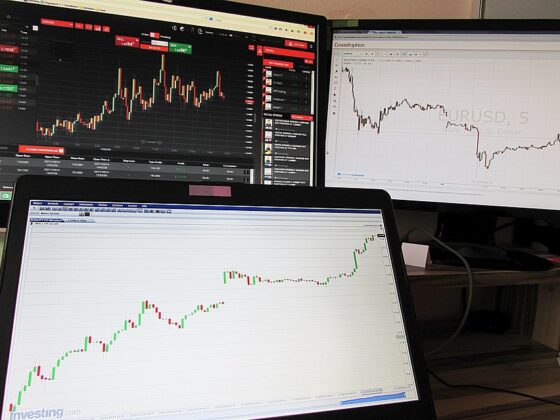In today's fast-paced and ever-changing market, staying ahead of the curve is essential for building and maintaining a successful portfolio. To help you navigate the complexities of trading, we've compiled a list of tips and strategies that can help you maximize your investments and minimize risk.
1. Stay Informed: One of the most important aspects of successful trading is staying informed about market trends, news, and events that may impact your investments. Make it a habit to regularly read financial news publications, follow reputable sources on social media, and attend seminars or webinars to stay up-to-date with the latest information.
2. Diversify Your Portfolio: Diversification is key to reducing risk and maximizing returns. By spreading your investments across different asset classes, industries, and geographic regions, you can minimize the impact of market fluctuations on your overall portfolio.
3. Set Clear Goals: Before you start trading, it's important to set clear and achievable goals for your investments. Whether you're looking to save for retirement, build wealth, or generate passive income, having a clear objective in mind will help you make informed decisions and stay focused on your long-term financial goals.
4. Keep Emotions in Check: Emotions can often cloud judgment and lead to impulsive decision-making. To avoid making irrational choices, it's essential to keep your emotions in check and stick to your trading plan. Consider setting stop-loss orders to limit potential losses and avoid making emotional decisions in times of market volatility.
5. Practice Risk Management: No trading strategy is foolproof, so it's important to practice effective risk management techniques to protect your investments. Consider setting risk limits, diversifying your holdings, and using stop-loss orders to minimize potential losses and protect your portfolio from market downturns.
6. Stay Disciplined: Consistency is key to successful trading. Stay disciplined in following your trading plan, setting realistic targets, and sticking to your investment strategy. Avoid chasing hot stocks or making impulsive decisions based on short-term market fluctuations.
7. Seek Professional Advice: If you're new to trading or feeling overwhelmed by the complexities of the market, it may be helpful to seek professional advice from a financial advisor or investment specialist. A professional can help you develop a customized investment strategy, provide guidance on navigating market trends, and offer valuable insights on building a successful portfolio.
8. Learn from Mistakes: Trading is a learning process, and mistakes are inevitable. Instead of dwelling on past failures, use them as an opportunity to learn and improve your trading strategies. Consider keeping a trading journal to track your decisions, evaluate your performance, and identify areas for improvement.
9. Stay Patient: Building a successful portfolio takes time and patience. Avoid the temptation to chase quick gains or jump on every market trend. Stay focused on your long-term goals, stick to your investment plan, and trust the process.
10. Monitor Your Portfolio: Regularly monitor your investments, review your performance, and make adjustments as needed. Stay proactive in managing your portfolio, staying informed about market trends, and making informed decisions to maximize your returns and minimize risk.
FAQs:
Q: What are the best trading strategies for beginners?
A: For beginners, it's important to start with a solid foundation of knowledge and understanding of the market. Consider starting with a long-term investment strategy, diversifying your portfolio, and seeking professional advice to help you navigate the complexities of trading.
Q: How can I minimize risk in my portfolio?
A: Risk management is essential for protecting your investments. Consider setting risk limits, diversifying your holdings, using stop-loss orders, and staying informed about market trends to minimize risk in your portfolio.
Q: How often should I review my portfolio?
A: It's recommended to regularly monitor your investments, review your performance, and make adjustments as needed. Consider setting aside time each month to review your portfolio, assess your performance, and make informed decisions to maximize your returns.
Q: Should I invest in individual stocks or mutual funds?
A: The decision to invest in individual stocks or mutual funds depends on your risk tolerance, investment goals, and level of expertise. Consider seeking professional advice to help you determine the best investment strategy for your financial goals.
In conclusion, staying ahead of the curve in trading requires a combination of knowledge, discipline, and patience. By following these tips and strategies, you can build a successful portfolio, minimize risk, and maximize your returns in today's competitive market. Remember to stay informed, set clear goals, practice risk management, and seek professional advice to help you navigate the complexities of trading and achieve your financial goals.











